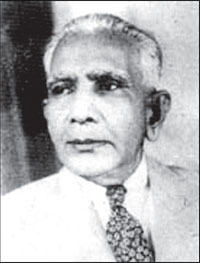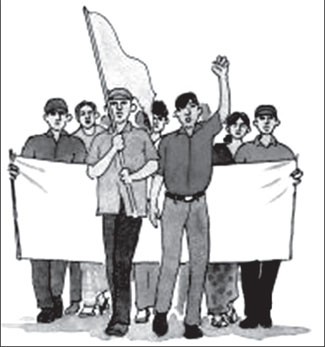|
Peri Sundaram:
Patriot, freedom fighter and workers’ champion
M.P.S.
Peri Sundaram was not born with the proverbial silver spoon in his
mouth nor did he belong to the feudal Sri Lankan clan which enjoyed the
privileges of wealth and the patronage of the colonial administration.
He could lay no claim to a patrician upbringing nor did his parents
belong to the charmed circle of hand picked and well rewarded members of
the indigenous establishment that sustained the British Raj.
|

Peri Sundaram |
He saw the light of day on Nillomally Estate - a tea plantation in
Madulkelle - in the home of Head Kangany Periannan and Meenatchiammal as
their first born. It is a wonder that mother and child survived the
rigours of child birth considering that maternity and childcare
facilities on the plantation were conspicuous by their absence and the
infant and maternal mortality rates on the plantations were the highest
in the island.
The first gaze of infant Peri Sundaram must no doubt have focussed on
the majestic spectacle of undulating hillsides covered by a vast expanse
of luscious green carefully nursed tea bushes crowned by the hilltop
mansions of the British managers starkly contrasted by the primitive
ill-ventilated one roomed back to back hovels sans light, piped water
and toilets which housed the producers of the ‘Black Gold’ - mainstay of
the economy of the country and the colonial administration. This paradox
of visible prosperity existing check-by-jowl with human misery and
degradation endured by a captive labour force left an indelible
impression on his young and fertile mind.
Peri Sundaram’s financial resources being meagre it seemed inevitable
that he would have to make do with the limited educational opportunities
that the colony could offer, but the young man who had emerged from the
back water of a plantation by ‘pulling himself up by his bootstraps’ was
not to be denied.
Cambridge University
He was of the firm conviction that he needed to acquire high
educational qualifications in order to be in the vanguard of the
struggle for national liberation and economic and social reform.
Considering that English was the official language. British colonies a
liberal in the English education was of tremendous value to national
leaders in the conduct of high level parleys for constitutional reform
and the transaction of business in the state legislative bodies.
England - the citadel of the British Empire - was universally
acclaimed at the time as the ‘Mecca’ of English learning and culture.
The Universities of Oxford and Cambridge had cradled and nurtured
generations of men of outstanding talent who had straddled the world’s
stage with great distinction. It was tantamount to an attempt to pass
through the needle’s eye for a ‘native’ of the colonies to entertain the
ambition of entering this ‘sanctum sanctorum’ and particularly for those
who could ill-afford the prohibitive cost of this luxury.
 Peri
Sundaram knuckled down to the unenviable task of gaining admission to a
recognised British university and acquiring the funds needed to cover
the cost of his travel, tuition fees and expenses in the UK. While
pursuing his law studies in Colombo he used his spare time profitably
tutoring students and by supplementing his savings with loans and
contributions obtained from friends and relatives was able to realize
the amounts required. Peri
Sundaram knuckled down to the unenviable task of gaining admission to a
recognised British university and acquiring the funds needed to cover
the cost of his travel, tuition fees and expenses in the UK. While
pursuing his law studies in Colombo he used his spare time profitably
tutoring students and by supplementing his savings with loans and
contributions obtained from friends and relatives was able to realize
the amounts required.
He succeeded in gaining admission to Emmanuel College, Cambridge and
set sail for the UK in 1913 via the Cape of Good Hope shortly before the
Suez Canal was opened. It was the year in which Sylvia Pankhurst, the
notable suffragette was jailed in England, Mahatma Gandhi (then known as
Mohandas Gandhi, a British educated lawyer) was jailed for refusing to
pay a fine for defying a law prohibiting Indians from Natal entering
Transvaal in South Africa and the Nobel prize for literature was awarded
for the first time to an Asian-Rabindranath Tagore, the Indian poet.
At Cambridge University, Peri Sundaram, the undergraduate, did not
let the ‘grass grow under his feet’. He had come at great expense to
imbibe at the world famous fountain of learning and be enriched by its
hallowed traditions. It was a time when the winds of change were
sweeping over the UK, liberal principles taking root in the country and
an awareness of the need to protect and promote the liberty of the
individual was growing. It was Peri Sundaram’s chance of a lifetime
and he was determined to make the most of it. He threw himself with
great vigour and enthusiasm into the corporate life of the university.
In recognition of his talent and popularity he was elected to the
important positions of President, Cambridge Ceylon Society, President,
Indian Majilis, Vice President, Emmanuel Law Society and was twice
elected a Committee Member of the Cambridge Union Society. He graduated
in 1916 and obtained the degrees of Bachelor of Arts and Bachelor of
Laws (BA, LLB) and in the same year qualified as a Barrister-at-Law
(Grey’s Inn) and was called on to the English Bar.
It was no mean achievement that Peri Sundaram obtained his high
academic and professional qualifications in the UK in the relatively
short period of 33 months and is a pointer to his resolve to return to
his native land to accomplish his life’s mission.
While in the UK he had the opportunity to exchange views and forge
personal relationships with personalities within the country and from
colonial territories notably India who were either in sympathy or
actively involved with the agitation for independence from British rule.
He commenced a close relationship in the UK with the late Sri V V Giri,
who later functioned as the Indian High Commissioner in the UK and
President of India.
Freedom struggle
On his return to Sri Lanka in 1916 he was admitted to the Sri Lankan
Bar as an Advocate of the Supreme Court and started the practice of his
profession. His first priority was the struggle for national liberation
and social reform reinforced and renewed by his exposure to progressive
developments in the UK and the Western world particularly in regard to
human rights and civil liberties.
Peri Sundaram lost no time in translating his patriotic fervour into
practical action. He joined the national leaders of the day - notably
the brilliant siblings and much respected legal luminaries and statesmen
Sir Ponnambalam Ramanathan and Sir Ponnambalam Arunachalam, Sir Baron
Jayatilleke, E W Perera and D S Senanayake - in founding the Ceylon
National Congress in 1919 with the declared objective of winning
independence for the country.
The colonial regime had introduced and supported a system which
ensured that the myth of white superiority was firmly entrenched and
perpetrated in order to continue the subjugation of the colonies. This
was achieved by a variety of measures such as white men’s clubs and
segregation on the trains.
It was a form of apartheid which Peri Sundaram found most
objectionable and contrary to the rule of law and British justice.
Fortified by his legal education in the UK and his crusading spirit of
fighting against injustice he resolved to challenge the iniquitous
system.
It was taboo for ‘a native’ to share the same railway carriage with
his imperialist master. Peri Sundaram with great deliberation purchased
a first class railway ticket and sat in a carriage occupied by an
Englishman who promptly ordered him to leave the carriage. Peri Sundaram
stood his ground. On returning to Colombo he instituted legal
proceedings and applied to the court for declaration of his rights. The
case attracted considerable public attention at the time and was a
‘cause celebre’. Peri Sundaram’s case was argued with great skill and he
obtained a sensational judgement in his favour which endeared him to the
people as a doughty fighter against colonialism.
First workers’ organization
He was deeply concerned at the plight of Sri Lankan workers who were
unorganized and had no legal protection against exploitation and unfair
labour practices having had first hand experience of the sub-human
conditions of work and life of plantation workers. In July 1919, formed
the first labour union - The Workers’ Welfare League - of which he was
founding Secretary. He also founded and became the first Secretary of
the Ceylon Workers’ Federation. These were the first shots in Peri
Sundaram’s crusade to win legal recognition for workers’ organizations
and protection under the law for trade union activities by creating in
the workers an awareness of the importance of forming their own
organizations in order to improve their working and living conditions.
The golden era
The pressure kept up by the Ceylon National Congress and other
nationalist groups in conjunction with the political developments in
India struck a responsive cord in the Colonial Office and a Commission
headed by Lord Donoughmore was appointed in 1928 to report on the
desirability of introducing constitutional reforms for Ceylon. At that
time the Legislative Council was the only body which featured the
representatives of the indigenous population who were elected on a
communal basis on a limited franchise based on educational and property
qualifications resulting in the majority of the population being
ineligible to vote.
To be continued |



